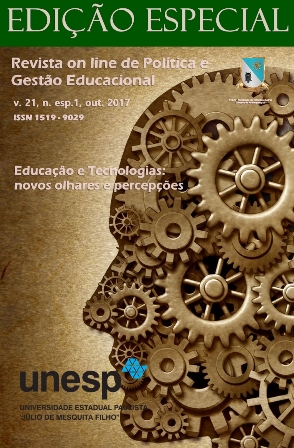HYBRID APPROACH IN HIGHER EDUCATION: THEORETICAL-METHODOLOGICAL REFLECTIONS
DOI:
https://doi.org/10.22633/rpge.v21.n.esp1.out.2017.9826Keywords:
Hybrid teaching. Teacher. Higher educationAbstract
The study in question deals with theoretical and methodological concepts built in the Research Group on Education and Technologies - GPET, at the Integrated Regional University of Alto Uruguai and the Missions - URI Campus of Frederico Westphalen - RS. It aims to approach Hybrid Education as a source of interactive practices in Higher Education. Its methodology is the qualitative study, through the theoretical research and brings in its reference the main exponents: Prensky (2010), Christensen (2015), Bacich (2015). Institutions have been receiving a native digital generation that expresses their knowledge and desires to learn, with technology as a strong ally. It is urgent to prepare the teacher for reflexive practice, innovation and interaction. As a conclusion, the hypothesis of Hybrid Teaching combines the interactivity and knowledge so necessary to this generation that it arrived at the university and allows the teacher to institute a methodology that proposes the wide exchange of ideas and the ability to dialogue about contents in an interactive and differentiated way.
Downloads
References
ALMEIDA, M. E. B. de. e SILVA, M. da G. M. da. Currículo, tecnologia e cultura digital: espaços e tempos de web currículo. Revista e-curriculum, São Paulo, v.7 n.1 Abril/2011.
BACICH, Lilian; NETO, Adolfo Tanzi; TREVISANI, Fernando de Mello (Orgs.). Ensino híbrido: personalização e tecnologia na educação. Porto Alegre: Penso, 2015.
CERUTTI, Elisabete. GIRAFFA, Lucia Maria Martins. Uma nova juventude chegou à universidade: e agora, professor¿. 1. Ed. Curitiba, PR, CRV, 2015.
CHRISTENSEN, Claiton M; HORN, Micehael B; STAKER, Heather. Ensino Hibrido: uma Inovaçao Disruptiva? Uma introdução à teoria dos híbridos. Disponível em: <http://porvir.org/wp-content/uploads/2014/08/PT_Is-K-12-blended-learning-disruptive-Final.pdf>. Acesso em 28 de abr. 2016.
CRISTENSEN, M.; HORN, M.; STAKER, H. Ensino híbrido: uma inovação disruptiva. Uma introdução à teoria dos híbridos. Instituto Península (Trad.). Fundação Lemann. Porto Alegre: Penso, 2013.
KENSKI, V. M. Tecnologias e ensino presencial e a distância. 3.ed. Campinas, SP: Papirus, 2003.
LÉVY P. O ciberespaço como um passo metaevolutivo. Porto Alegre: Sulina, 2004.
LÉVY P. P. Cibercultura: São Paulo, Editora 34, 1999.
LATOUR, Bruno. Ciência em ação: como seguir cientistas e engenheiros sociedade afora. Benedetti, Ivone (Trad.), 2 ed São Paulo: Editora Unesp, 2011.
MORAN, José Manuel. Desafios na Comunicação Pessoal. 3ª Ed. São Paulo: Paulinas, 2007.
PRENSKY, Marc. Teaching Digital Natives: Partnering for Real Learning. New York: Corwin, 2010.
SILVA, Rodrigo Abrantes da; CAMARGO, Ailton Luiz. A cultura escolar na era digital. In: BACICH, Lilian; NETO, Adolfo Tanzi; TREVISANI, Fernando de Mello (Orgs.). Ensino híbrido: personalização e tecnologia na educação. Porto Alegre: Penso, 2015.
RÜDIGER, Francisco. As teorias de cibercultura. Porto Alegre, RS: Sulina, 2011.












